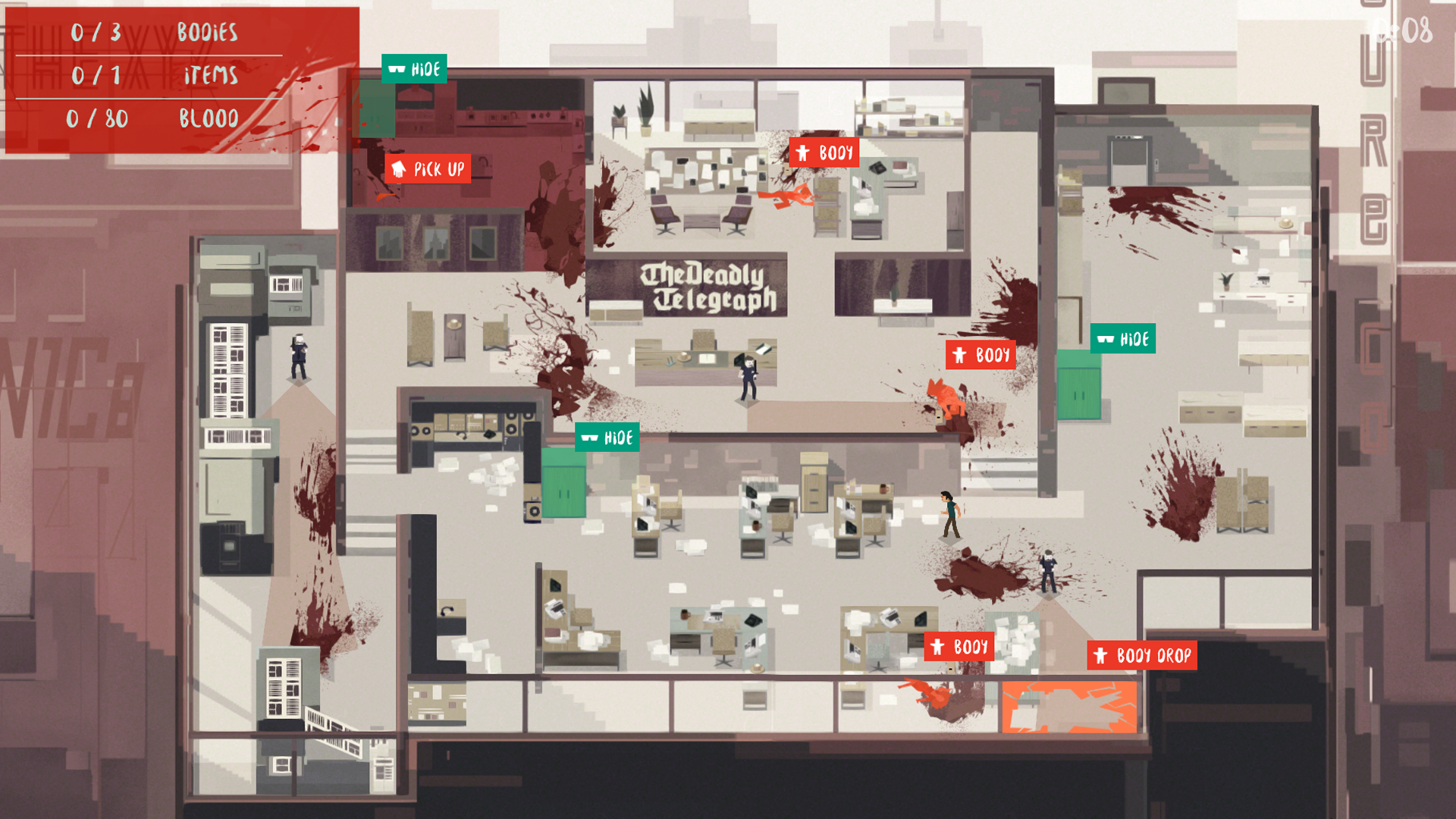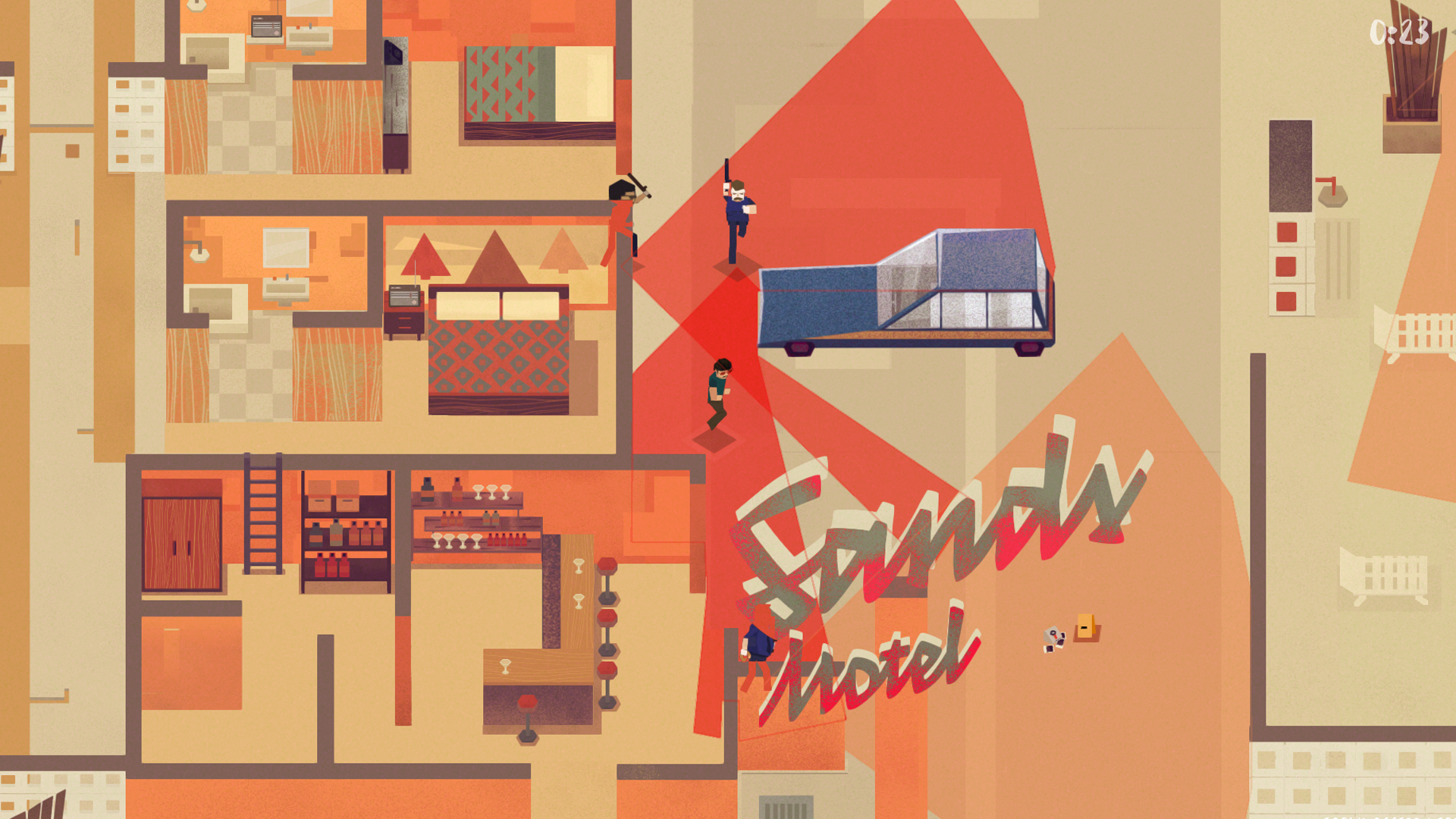Serial Cleaner's luscious puzzles blend Hotline Miami with clean ‘70s chic

Nothing, as the adage and Jane’s Addiction records tell us, is shocking. The comedy by way of horrific violence video game is a format old as dirt. Forget the gory glory of Hotline Miami; early arcade designers were milking yuks out of horror back in the ‘70s with games like Death Race. If you’re going to leverage sociopathy for humor and a really great game hook, you can’t rely on the violence to draw people’s attention. The game has to be good, really good, or its socially objectionable material will come off as crass at best, desperate at worst. In short: you better make sure you game is Serial Cleaner, a sharp as nails blend of ‘70s style, clever puzzle solving, flexible stealth and gross violence.
Dennator’s influential ‘80s nightmare Hotline Miami is a vital reference point for Serial Cleaner’s tight ‘70s tableau. The same overhead view of mundane settings like offices and bathrooms is used here, but presented in a flat, hygenic pop art. The trees at a campground in one stage, the storage units in another are angular and rigid, wrought in earthy browns, oranges, and reds. The Cleaner you control in these stages is as precise as the art; this is the guy that would arrive on the scene after the killer in the animal masks from Hotline did his dirty business. The goal in each stage of Serial Cleaner is the same: remove the bodies and murder weapons from the scene already being investigated by police, and mop up the gallons of blood spilled all over the place. And do it all without being spotted.
At first, the challenge of Serial Cleaner is every bit as simple as it sounds. March into a stage, pick up unmentionables, don’t get got. If that’s all there was to it, Serial Cleaner would still feel like a fun puzzle game. Take the second stage, where the cleaner sets up outside a gym where he has to dispose of the body of a wrestler, disappearing a bloody championship belt in the process. With the shining little details of the locker room, the subtle animations of the cops eating donuts as they patrol back and forth, the whole scene is immediately funny and understandable. When I pressed the button that let me view the whole map at the start of the level, figuring out where set hiding places were in case I was seen, I immediately laughed at the absurdity of it all and plotted my route. I laughed even harder when the cops spotted me and I tried to scamper off, my little Cleaner in his aviator shades pumping his legs like a panicked Scooby Doo character.
The puzzles can’t be predicted, though. On my second try at the gym, I couldn’t use the same route. This is how Serial Cleaner bakes replayability into its premise. Since the puzzles and stealth would become stale as soon as you mastered a functional route, each stage randomizes where the bodies, murder weapons, and blood are. The number of bodies, the stage and the cops patrolling are always the same so you can become intimately familiar with your surroundings. How you actually succeed is randomized, though, and it becomes incredibly tricky to succeed as Serial Cleaner starts ramping up the number of bodies you need to remove.

Over six levels, I went from being able to clear a stage in one or two tries to spending nearly half an hour trying to get past a single one. What impressed me most is how different every single stage felt. Level 2’s wrestling drama was followed by a trailer park campground where I had to navigate wide open spaces where the cops had tons of clear sightlines. Level 4, though, took place in an old newspaper bullpen complete with printing press and dark room, all cramped hallways and desk areas, and I had to drop the bodies out the window. Every single stage felt like a complete short story told entirely through visuals and made absolutely hilarious by how mundane it felt to be vacuuming up blood so matter of factly as a dude with Starsky & Hutch hair. Every time I got caught, I laughed. Every time I entered a new stage, I was delighted to try and figure out what would and wouldn’t work.
There are some limits to the Serial Cleaner formula. The randomization of goals in each stage means that it’s not it might not appeal to the speedrunners that typically flock to this sort of stealth game. The specificity of the art in each of the game’s 20 story stages also means that they can’t throw in a level editor for people to make their own puzzles; these are handcrafted from the ground up. That mix of specificity and unpredictable scenarios elevates Serial Cleaner, though. It isn’t just a ‘70s riff on Hotline Miami, not just another game trying to shock you by making killer jokes about killers. It’s the good stuff and you should absolutely go play the Early Access version of the game if you don’t feel like waiting for the PS4 or Xbox One version to come out this summer.
Weekly digests, tales from the communities you love, and more



